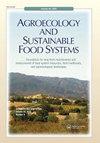评估基于gliriicidia农林业的干预措施对赞比亚东部省作物营养、抗营养、功能和矿物成分的影响
IF 2.6
3区 农林科学
Q1 AGRICULTURE, MULTIDISCIPLINARY
引用次数: 0
摘要
农林复合措施改善土壤健康,进而提高作物养分浓度和品质。本研究考察了间作大豆、花生或玉米对农林业树木油树营养成分的影响。该研究在赞比亚五个酋长领地进行,为期三个作物生长季节(2019-2022年),在13个农民主导的示范试验点进行。试验了7种处理,包括玉米、大豆和花生地,有和没有葛氏菌干预。采用标准的实验室方法对粮食样品进行作物养分含量分析。结果表明:除粗纤维、总碳水化合物和代谢能外,各处理显著(P < 0.05)提高了玉米的营养性能。玉米、大豆间作可降低其抗营养成分,提高其功能品质。除钾、钙和钠外,玉米间作处理的所有元素矿物成分均高于对照处理。除Mg、Cu和Zn外,大豆间作的平均矿物质浓度低于对照(仅大豆)。芒萁+花生间作显著增加了花生除氮、磷、钾和铁外的其他矿质成分。综上所述,间作玉米、大豆和花生可显著提高作物的营养品质。作者感谢NORAD/挪威外交部的财政支持,以及所有参与研究的农民的支持。披露声明作者未报告潜在的利益冲突。数据可用性声明支持本研究结果的数据可在https://doi.org/10.25502/0fa9-dm27/d.Supplemental上公开获取。本文的补充数据可在https://doi.org/10.1080/21683565.2023.2254711.Additional上在线获取。本文章由计算机程序翻译,如有差异,请以英文原文为准。
Assessing the impact of Gliricidia agroforestry-based interventions on crop nutritional, antinutritional, functional, and mineral compositions in eastern Province, Zambia
ABSTRACTAgroforestry practices improve soil health which in turn improves crop nutrient concentrations and quality. This study examined how the agroforestry tree Gliricidia sepium intercropped with soybean, groundnuts, or maize affects crop nutrient compositions. The study was conducted in five Zambian chiefdoms for three crop-growing seasons (2019–2022) on 13 farmer-led demonstration trial sites. Seven treatments were tested that included maize, soybean, and groundnut plots with and without Gliricidia interventions. Grain samples were analyzed for crop nutrient contents using standard laboratory methods. Results showed that the treatments significantly (P < 0.05) improved maize nutritional properties except for crude fiber, total carbohydrate, and metabolizable energy. G. sepium intercropping with maize and soybean decreased the antinutritional contents and displayed better functional qualities. All elemental mineral components (except potassium, calcium, and sodium) were higher in the Gliricidia + maize intercrop than in the control treatment. The Gliricidia+soybean intercrop had lower mean mineral concentrations than the control (soybean only) except for Mg, Cu, and Zn. The Giliricidia+groundnut intercrop significantly increased groundnut mineral components except for Nitrogen, Phosphorus, Potassium, and Iron. It can be concluded that G. sepium intercropped with maize, soybean, and groundnuts significantly improved the crops’ nutritional quality.KEYWORDS: AgroforestryZambiaGliricidia sepiumlegumesnutritional qualitymineral AcknowledgmentsThe authors acknowledge the financial support from NORAD/Ministry of Foreign Affairs, Norway, and the support of all farmers participating in the study.Disclosure statementNo potential conflict of interest was reported by the author(s).Data availability statementThe data supporting this study’s findings are openly available at https://doi.org/10.25502/0fa9-dm27/d.Supplemental dataSupplemental data for this article can be accessed online at https://doi.org/10.1080/21683565.2023.2254711.Additional informationFundingThis project has received funding from the Norwegian Agency for Development Cooperation (Norad) under Saksnr: 1800165-18.
求助全文
通过发布文献求助,成功后即可免费获取论文全文。
去求助
来源期刊

Agroecology and Sustainable Food Systems
AGRICULTURE, MULTIDISCIPLINARY-GREEN & SUSTAINABLE SCIENCE & TECHNOLOGY
CiteScore
4.80
自引率
7.70%
发文量
73
期刊介绍:
Agroecology and Sustainable Food Systems is devoted to the rapidly emerging fields of agroecology and food system sustainability. By linking scientific inquiry and productive practice with transformative social action, agroecology provides a foundation for developing the alternative food systems of the future. The journal focuses on the changes that need to occur in the design and management of our food systems in order to balance natural resource use and environmental protection with the needs of production, economic viability, food security, and the social well-being of all people.
Agroecology and Sustainable Food Systems examines our current food systems from production to consumption, and the urgent need to transition to long-term sustainability. The journal promotes the study and application of agroecology for developing alternatives to the complex problems of resource depletion, environmental degradation, a narrowing of agrobiodiversity, continued world hunger, consolidation and industrialization of the food system, climate change, and the loss of farm land. The journal uses a food systems approach, and seeks experiences in agroecology that are on-farm, participatory, change-oriented, and backed by broad-based methodologies of sustainability analysis and evaluation.
 求助内容:
求助内容: 应助结果提醒方式:
应助结果提醒方式:


